Twenty Years of Marriage Equality: Three Couples’ Stories
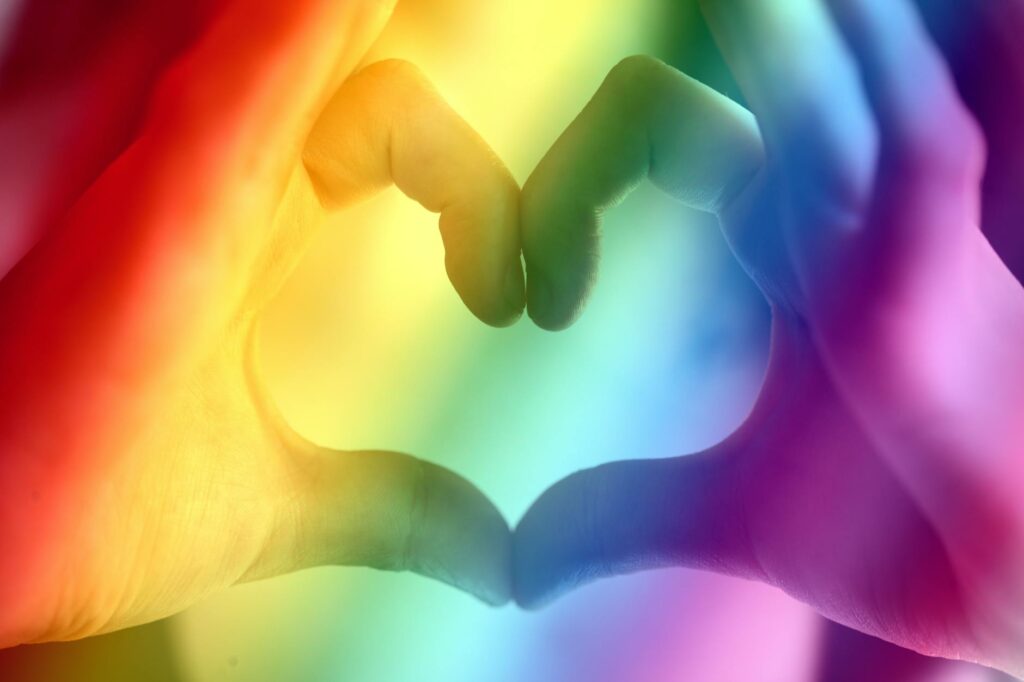
Photo: Alexander Grey / Pexels.com
The following article appeared previously in the Amherst Current. It is reposted here with permission.
Devorah Jacobson and Margaret Mastrangelo were first in line at Amherst Town Hall on May 17, 2004, the morning when marriage licenses became available to same-sex couples.
“It was pretty exciting,” Margaret said as she recalled getting their license at the town clerk’s office. “We never thought we would see marriage equality in our lifetimes.”
I was also at Town Hall that morning 20 years ago, to document the occasion for the newspaper. The front of the building was decorated with balloons and a banner reading “Amherst welcomes all newlyweds.” A proclamation on the door read, “The Select Board welcomes all couples who are ready to make the commitment of marriage and extends our warmest wishes for their future happiness together.”
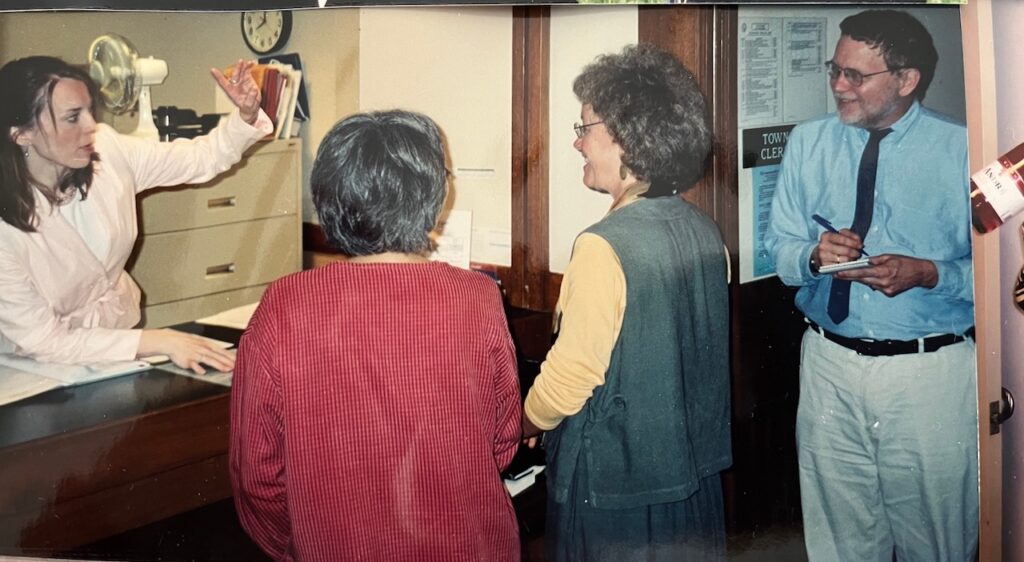
Seven lesbian couples applied for marriage licenses in the first half-hour of that joyful day. I tracked down three of them to get their perspectives on 20 years of marriage equality.
Devorah and Margaret
Devorah and Margaret had a wedding ceremony on Mt. Pollux three days after getting their license. They were among the first same-sex couples in the U.S. to be legally married; in 2015 the Supreme Court followed Massachusetts’ lead and made marriage equality the law of the land. The Court ruled that “the right to marry is a fundamental right inherent in the liberty of the person.”
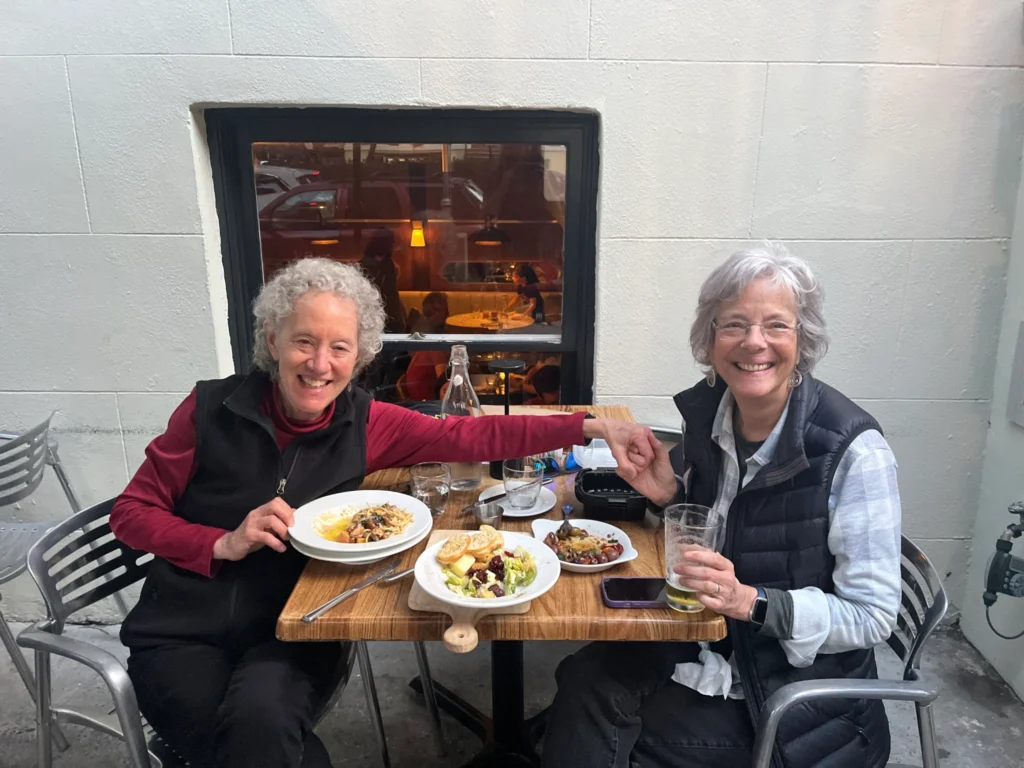
“For me, it was on one hand a pragmatic decision,” said Devorah, a rabbi and part-time director of spiritual life at JGS Lifecare in Longmeadow. There are 1,000 federal benefits attached to marriage, and she and Margaret believed that Massachusetts’ action would be a step in the direction of nationwide acceptance.
“We wanted to be part of this movement,” Devorah said. “It was a bit of activism, something we could do to move society forward.” Margaret added, “It was more than just us.”
She was thinking about the following generation, which now takes marriage equality for granted, but also about heterosexual couples. “They got to see that lesbian and gay couples live the same kinds of lives they live,” Margaret said. “That legitimacy made it easier for the next generation of young people grappling with their identity to be who they are, once that hurdle was passed.”
Heterosexuals have assumed they have job security, while some gays and lesbians have risked unemployment by being open about their orientation, said Margaret, a nurse practitioner. “This was monumental in terms of security,” she said, “and I’m not sure heterosexuals understand that many of us were living under a cloud.”
Devorah and Margaret can now file their taxes jointly, and if one of them needs to go into a hospital, the other will have no problem gaining access.
After receiving their license 20 years ago, Margaret said, “I hope people come to recognize that in no way does my marriage undermine anyone else’s marriage.”
“We’re all looking for the same things in life: loving, caring relationships,” said Devorah.
Connie and Susan
Connie Kruger had worked in the Planning Department at Town Hall for 16 years. When she returned there with her partner, Susan Tracy, to get a marriage license, she was greeted with a hug by then-Town Manager Barry Del Castilho.
Susan remembered how excited people in the town clerk’s office were on that day 20 years ago. There was a big cake in the Town Room at the reception.
“We couldn’t have asked for a more welcoming and affirming day,” Connie said. Susan added, “It’s a memory that makes me deeply grateful and appreciative of the town.”
They also had a marriage ceremony at their home a month later. The invitation read, “Come help us make history.”
“We realized afterwards that it made a difference to us and our families, even though everyone already accepted us,” Connie said. “There was something about getting up in front of people and committing. It shifted something in a very positive way.”
Susan, a retired history professor at Hampshire College, felt a sense of history because Massachusetts was the first state to legalize marriage equality. In 2015, she wrote a letter to the Supreme Court about a week three years previously when she and Connie drove home from Texas. They felt anxious driving through the South even though they had been legally married in Massachusetts for eight years.
“It was odd to realize that we felt more at ease and comfortable traveling in Canada and Europe than we did in our own country,” she wrote. “Like free blacks in the United States in the 1850s, our lives in this country are balanced on a checkerboard of friendliness and hostility, rights and discrimination, and our freedom in the ‘free states’ will continue to be at risk unless the law recognizes the integrity of our lives and marriages throughout the United States.”
Although marriage equality is now widely accepted, Susan fears a MAGA backlash. “They would unmarry us in a heartbeat,” she said. The Supreme Court has already taken away reproductive rights, she noted, and only two of the nine justices from the 2015 decision are still on the Court.
Twelve years ago, Susan had a serious illness. “I could go to the hospital and be recognized and seen, the way most married people take for granted,” said Connie. Susan added that when she fills a prescription for Connie, “people under 45 roll with that.”
Trans rights are “the new frontier,” Connie said. “Their right to marry and be protected legally and be visible is the next part of this social justice issue.”
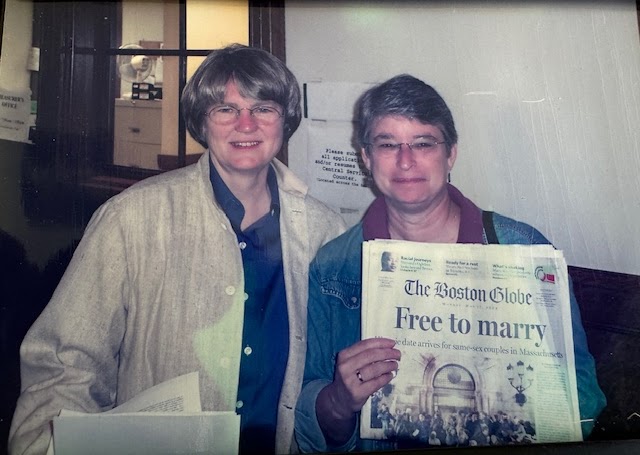
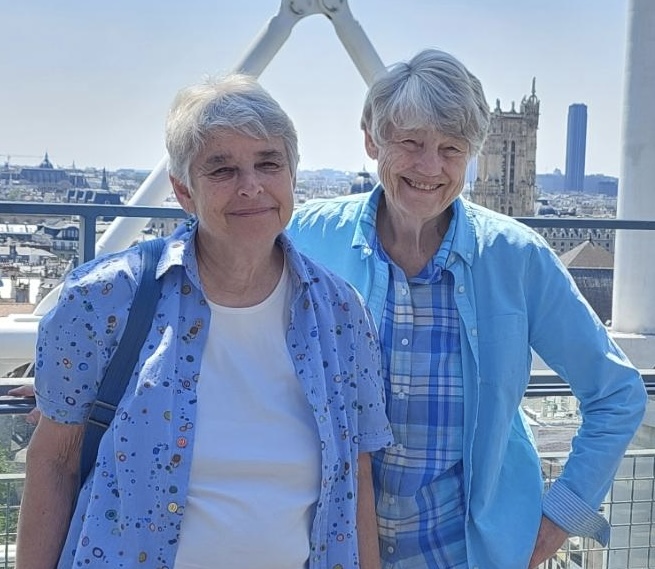
Marguerite and Dorrie
The Rev. Marguerite Sheehan and Dorrie Merriam got married, in the back yard of their house, three days after receiving their license at Amherst Town Hall.
“I was terribly excited,” said Dorrie. “It wasn’t something we could ever imagine in our lifetimes.” They got married immediately, said Dorrie, because they were worried that their new right could be taken away. “If we were married, they would have a hard time taking our license away,” she said.
Marguerite, who is the interim pastor at the Edwards Church in Northampton, recalled that the Rev. Rob Hirschfeld, rector of Grace Episcopal Church, gave a blessing at the Town Hall reception 20 years ago. Hirschfeld, now the bishop of New Hampshire, had previously declined to officiate at any marriages until same-sex couples had the same rights as heterosexual couples.
Marguerite and Dorrie came to Town Hall wearing identical hats that read “Bride” with “Party A” and “Party B” written in sparkle, reflecting the new words on marriage licenses.
“One of the most dramatic things about that day was the overwhelming enthusiasm and heartfelt emotion from the town clerk’s office,” said Marguerite. “They said they were so troubled for so many years to have to deny same-sex couples marriage licenses. It was wonderful to hear that it was not just we who were troubled by the legal restrictions but also clerks who had to do something against their desires.”
Anna Maciazcek, who was town clerk at the time, had to hire extra help for the early rush of applications for marriage licenses.
Marguerite and Dorrie had already had a commitment ceremony, but “having the government celebrating our relationship and justifying it was really important,” Dorrie said. Before the Supreme Court ruling, they could not benefit from each other’s Social Security when they retired, as heterosexual couples could.
Even now, they don’t feel they can rest easy, and marriage equality is still insecure. “Many people are not comfortable with it and there could be quite a backlash,” Marguerite said. Dorrie added, “You still hear politicians talking about overturning these rights.”
Dorrie said that she once had no hope of ever being married. “It was made clear to me when I was very young that a relationship with someone of the same sex was aberrant, unacceptable, something to be hidden,” she said. “There was a big hole in my life, not being open and free in relationship with someone.”
Marguerite said that day 20 years ago made “a big difference, helping us imagine that our relationships would be honored by other people, and eventually become legal” throughout the country.
Now, Dorrie said, she feels accepted and loved.
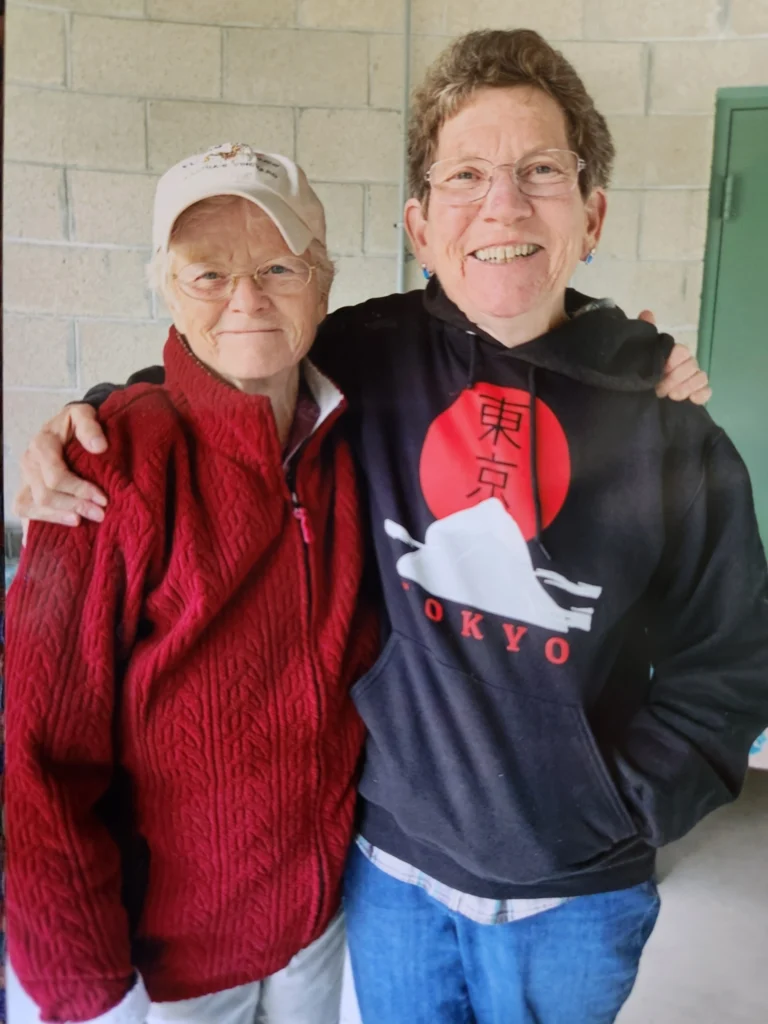
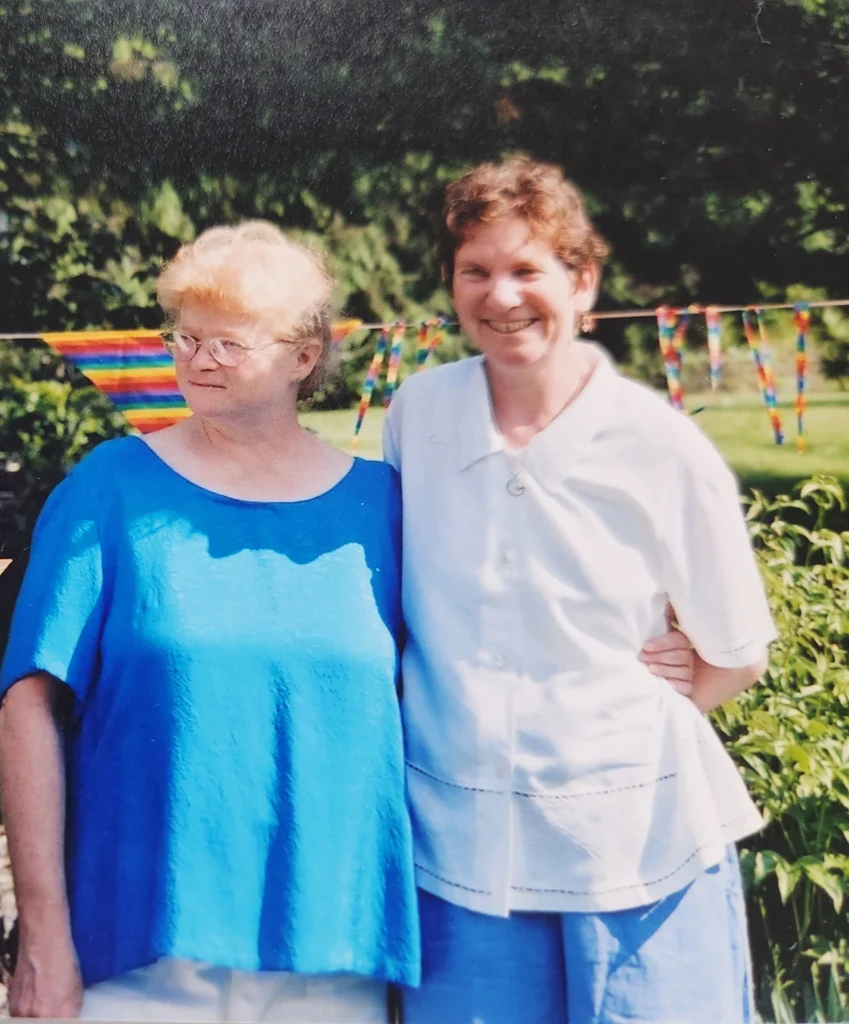

A lovely piece! Thank you, Nick.